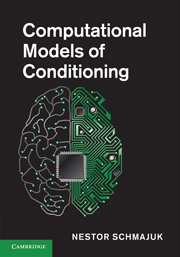Book contents
- Frontmatter
- Contents
- List of contributors
- Introduction
- 1 Evolution of attention in learning
- 2 The arguments of associations
- 3 The hybrid modeling approach to conditioning
- 4 Within-compound associations: models and data
- 5 Associative modulation of US processing: implications for understanding of habituation
- 6 Attention, associations, and configurations in conditioning
- 7 Computer simulation of the cerebellum
- 8 The operant/respondent distinction: a computational neural-network analysis
- Index
- References
1 - Evolution of attention in learning
Published online by Cambridge University Press: 10 January 2011
- Frontmatter
- Contents
- List of contributors
- Introduction
- 1 Evolution of attention in learning
- 2 The arguments of associations
- 3 The hybrid modeling approach to conditioning
- 4 Within-compound associations: models and data
- 5 Associative modulation of US processing: implications for understanding of habituation
- 6 Attention, associations, and configurations in conditioning
- 7 Computer simulation of the cerebellum
- 8 The operant/respondent distinction: a computational neural-network analysis
- Index
- References
Summary
Abstract
A variety of phenomena in associative learning suggest that people and some animals are able to learn how to allocate attention across cues. Models of attentional learning are motivated by the need to account for these phenomena. We start with a different, more general motivation for learners, namely, the need to learn quickly. Using simulated evolution, with adaptive fitness measured as overall accuracy during a lifetime of learning, we show that evolution converges to architectures that incorporate attentional learning. We describe the specific training environments that encourage this evolutionary trajectory and we describe how we assess attentional learning in the evolved learners.
Birds do it, bees do it; maybe ordinary fleas do it. They all learn from experience. But why is learning so ubiquitous? Why not just be born already knowing how to behave? That would save a lot of time and a lot of error. Presumably, we are born ignorant either because evolution is unfinished or because what we need to know is too complex to be fully coded in the genome. Either way, it seems that evolution has cleverly found a mechanism for dealing with the birth of ignorance; a mechanism that we call learning.
Of course, it may be that learning is merely something that organisms do for fun in their spare time. Perhaps there is not much adaptive value in learning, and little cost, and therefore no selective pressure on the mechanisms of learning.
- Type
- Chapter
- Information
- Computational Models of Conditioning , pp. 10 - 52Publisher: Cambridge University PressPrint publication year: 2010
References
- 6
- Cited by

